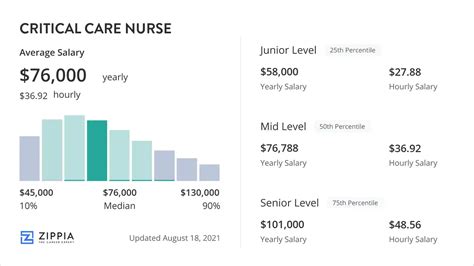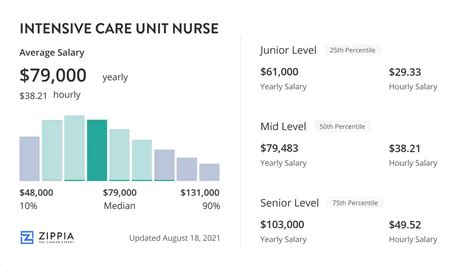For those drawn to a high-stakes, deeply rewarding career in healthcare, becoming an Intensive Care Unit (ICU) Nurse is a top-tier aspiration. These highly skilled professionals are the backbone of critical care, managing the most complex and life-threatening cases. But beyond the profound personal fulfillment, a career as an ICU nurse offers significant financial stability and growth. So, what can you expect to earn?
This in-depth guide will break down the salary potential for an ICU nurse, exploring average earnings that often start strong and can climb well into six figures with the right combination of experience, education, and strategic career moves.
What Does an Intensive Care Nurse Do?

An Intensive Care Nurse, also known as a Critical Care Nurse, provides specialized care to patients with life-threatening illnesses or injuries. Working in the fast-paced, high-pressure environment of an ICU, they are responsible for:
- Continuous Monitoring: Closely observing patients' vital signs and physiological data using advanced medical equipment.
- Administering Complex Treatments: Managing ventilators, IV drips with potent medications, and other life-support systems.
- Rapid Decision-Making: Assessing critical changes in a patient's condition and intervening quickly and effectively.
- Collaboration and Advocacy: Working seamlessly with physicians, specialists, and other healthcare professionals, while acting as a fierce advocate for the patient and their family.
This demanding role requires a unique blend of sharp clinical skills, emotional resilience, and exceptional critical thinking—a level of expertise that is directly reflected in their compensation.
Average Intensive Care Nurse Salary

While salaries can vary significantly, the earning potential for an ICU nurse is robust. According to data from Salary.com, as of late 2023, the average ICU Nurse salary in the United States is approximately $95,290 per year. The typical salary range falls between $86,010 and $103,660, but this can expand significantly based on the factors we'll explore below.
It's helpful to look at the broader data for all Registered Nurses (RNs) to establish a baseline. The U.S. Bureau of Labor Statistics (BLS) reports that the median annual wage for all registered nurses was $86,070 in May 2023. The top 10% of RNs earned more than $132,680. ICU nurses, due to the specialized nature of their skills and the high-stress environment, typically earn in the upper-middle to top-tier of this range.
Key Factors That Influence Salary

Your base salary is just a starting point. Several key factors can dramatically increase your earning potential throughout your career.
###
Level of Education
While you can become a registered nurse with an Associate's Degree in Nursing (ADN), a Bachelor of Science in Nursing (BSN) is increasingly the standard, especially for specialized roles in critical care.
- ADN vs. BSN: Many hospitals, particularly Magnet-designated facilities, prefer or require a BSN for ICU positions. This preference can translate into higher starting salaries and more opportunities for advancement.
- Advanced Degrees: Pursuing a Master of Science in Nursing (MSN) or a Doctor of Nursing Practice (DNP) opens the door to the highest-paying roles. With an advanced degree, an ICU nurse can transition into positions like a Clinical Nurse Specialist (CNS), Acute Care Nurse Practitioner (ACNP), or a Nurse Manager, all of which command significantly higher salaries.
###
Years of Experience
Experience is one of the most direct influencers of an ICU nurse's salary. As you accumulate hands-on expertise, your value to an employer skyrockets. Data from Payscale illustrates this progression clearly:
- Entry-Level (0-1 year): A novice ICU nurse can expect to earn a solid starting salary, but it will be at the lower end of the national range.
- Early Career (1-4 years): With a few years of experience, nurses gain confidence and proficiency, which is reflected in a notable salary increase.
- Mid-Career (5-9 years): At this stage, nurses are often considered experts. They may take on charge nurse responsibilities or mentor new staff, leading to substantial pay bumps.
- Experienced (10+ years): Senior ICU nurses with a decade or more of experience command the highest salaries. They are invaluable assets to their units and are compensated accordingly.
###
Geographic Location
Where you work matters—a lot. Salaries for ICU nurses vary dramatically by state and even by metropolitan area, largely due to differences in cost of living and local demand.
According to the BLS data for Registered Nurses (May 2023), the top-paying states are:
1. California: $133,340 (Annual Mean Wage)
2. Hawaii: $114,640
3. Oregon: $109,620
4. Washington: $107,720
5. Alaska: $106,770
Conversely, states in the South and Midwest tend to have lower average salaries, though the cost of living in those areas is also significantly lower.
###
Company Type
The type of facility you work in also plays a crucial role in your compensation package.
- General Medical and Surgical Hospitals: As the largest employers of ICU nurses, these facilities offer competitive, market-rate salaries. Pay may be higher at large, urban academic medical centers or Magnet hospitals known for their high standards of nursing excellence.
- Government Facilities: Federal employers, such as the Department of Veterans Affairs (VA), often offer competitive salaries and excellent benefits packages, including generous retirement plans.
- Outpatient Care Centers: While less common for ICU work, specialized outpatient clinics or surgical centers may employ critical care nurses and can sometimes offer higher pay to attract top talent.
- Travel Nursing Agencies: For experienced ICU nurses, travel nursing can be an extremely lucrative option. Agencies often offer high hourly rates, tax-free stipends for housing and meals, and bonuses to fill urgent needs in high-demand locations.
###
Area of Specialization
Within the ICU, further specialization can enhance your skills and your salary. Additionally, obtaining professional certifications is a clear way to validate your expertise.
- Sub-Specialties: While general ICU experience is valuable, specializing in a high-acuity area like the Cardiovascular ICU (CVICU), Surgical ICU (SICU), or a Neonatal ICU (NICU) can make you a more sought-after candidate.
- Professional Certification: The single most impactful credential for an ICU nurse is the CCRN (Critical Care Registered Nurse) certification from the American Association of Critical-Care Nurses (AACN). Earning your CCRN demonstrates a high level of clinical knowledge and commitment to the profession. Many hospitals offer a salary differential, a one-time bonus, or give preference in hiring to nurses with this certification.
Job Outlook

The future for ICU nurses is exceptionally bright. The BLS projects that employment for all registered nurses will grow by 6% from 2022 to 2032, which is faster than the average for all occupations.
This growth is fueled by an aging population requiring more complex medical care and a greater focus on treating chronic conditions. The need for highly skilled nurses capable of managing critically ill patients will always be a top priority for healthcare systems, ensuring strong job security and continued demand for years to come.
Conclusion

A career as an Intensive Care Nurse is much more than a job; it's a calling that offers immense personal and professional rewards. The salary is a direct reflection of the skill, dedication, and resilience required to excel in this challenging field.
Key Takeaways:
- Strong Earning Potential: The average ICU nurse salary hovers around $95,000, with significant potential to exceed $100,000.
- You Control Your Growth: Your earnings are not static. You can actively increase your salary through higher education, gaining experience, and earning professional certifications like the CCRN.
- Location and Employer Matter: Choosing to work in a high-paying state or for a top-tier medical facility can dramatically impact your income.
- Excellent Job Security: With a strong, positive job outlook, you can be confident in building a long and stable career in critical care.
For anyone considering this demanding but vital career path, the financial prospects are just as promising as the opportunity to make a true difference in the lives of patients and their families.
